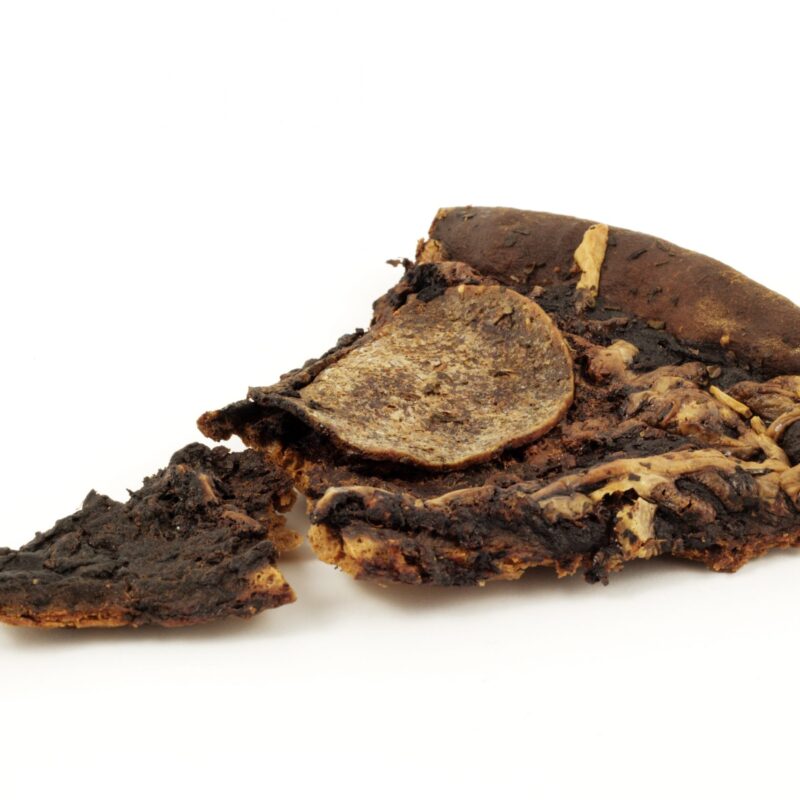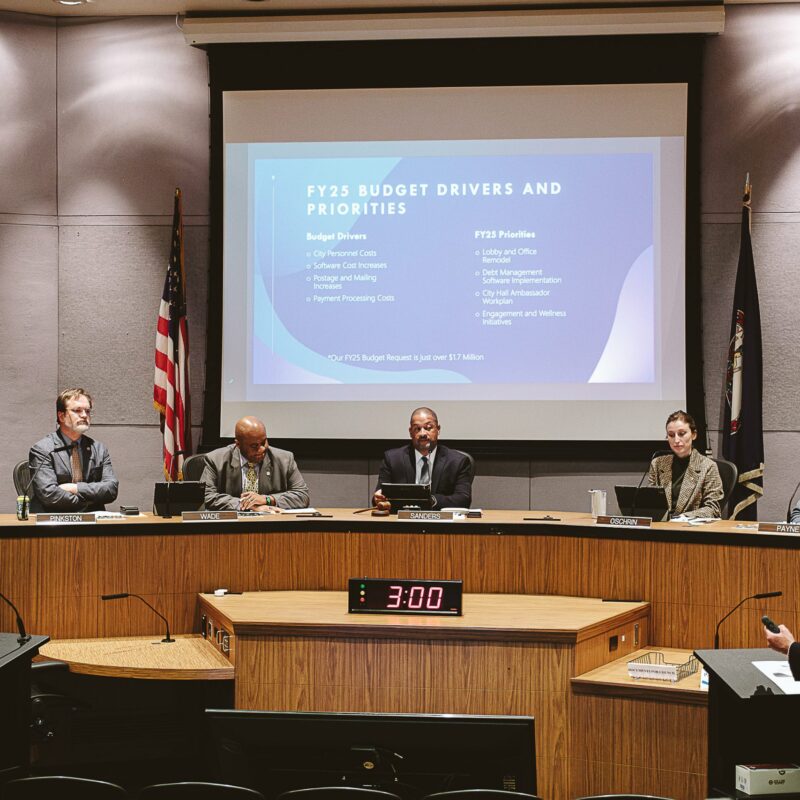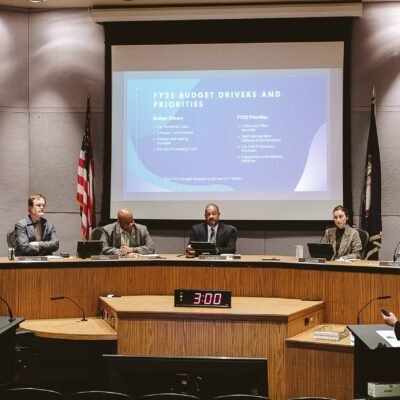WTJU is like a box of chocolates. Can it stay that way?
The management at UVA’s community radio station continues to face widespread consternation among its volunteer staff about a proposed set of changes that DJs fear would bring an end to free-form programming, long a hallmark of the station and its culture. “It seems like we’re going straight for what people in the past have called a ‘nuclear option’ that nullifies everything we know is good about WTJU,” DJ Tyler Magill said at a meeting between station volunteers and administrators last Thursday.
|
Burr Beard became general manager of WTJU in April and plans to institute changes to the station’s programming that DJs fear will “nullify everything we know is good about WTJU.” In an e-mail to staff, Burr wrote of the need for consistency at the station to remedy financial and listenership woes. “If we play a week’s worth of music rarely repeating a song, very few people hear the great new song you just played. People tune in and out of radio every minute,” Beard wrote in an e-mail to some volunteer DJs. |
The station’s volunteer staff uproared when Burr Beard, WTJU’s new general manager, sent an internal e-mail describing “The All New Consistent and Reliable WTJU.” It included plans for day-parting the station’s shows—all classical shows, for example, would happen at the same time daily—and requiring that DJs rotate songs from a playlist. Volunteers would have to commit to hosting shows weekly, as opposed to sharing a show with another DJ. “It’s not enough to expose people to new music when it’s just a smattering of all kinds of music,” Beard said in an internal e-mail. “Repetition is radio’s strong point.”
These words registered as blasphemy for many of the station’s DJs, who launched an e-mail and phone campaign directed at Beard, as well as Marian Anderfuren and Carol Wood of the UVA’s Department of Public Affairs, which has run the station since 2008. Magill started a blog on June 21, at savewtju.blogspot.net, a “clearing house” for community concern that boomed with posts through the week.
DJ Pete Marshall, host of the Saturday morning folk program “Sunset Road,” only received an e-mail that explained that “my program had been axed” because he happened to be on the station’s Jazz staff mailing list. He says most DJs weren’t alerted that, under the original plans, the next show would be their last. “It was abysmally mismanaged all the way up the chain,” Marshall says. He resigned in an e-mail, writing, “Burr only needs half as many DJs for his ‘master plan’. The master plan might work but honestly, Burr, your communication skills suck.”
By June 22, WTJU was given what another DJ called a “stay of execution.” Changes that were originally scheduled for early July will be rolled out in August, in time for the station’s major fundraising drive when students return. “When they announced that two-month delay, there was a frisson of people thinking, ‘This could really be something,’” Marshall says. “But the trust is gone. I’ve seen enough about the way they’re operating that I don’t want to work with them.
“And I don’t have to, I’m a volunteer.”
|
WTJU by the numbers • Radio frequency: 91.1 FM • Founded: 1957 • FY2010 revenue budget: $350,500 • Portion from student fees: $144,000 • Portion from the Corporation for Public Broadcasting: $71,000 • Portion from donors and underwriters: $135,000 • Budget shortfall in 2008-09: $23,000 of goal for donors and underwriters • Weekly Listenership: 7,500 |
Broadcast delay
UVA administrators were willing to admit error in execution. “We sent the train too quickly down the track,” Beard, Wood and Anderfuren wrote in an e-mail. “We’re resetting the process to bring you and your ideas to the table,” they wrote, explaining that they would launch a blog within 24 hours as a forum for staff and community input. (That blog was posted by Thursday afternoon at www.virginia.edu/wtjuforum.) Rock co-director Nick Rubin said that the mood was cordial at a June 23 meeting of the station’s advisory board, with Anderfuren, Wood and Beard present. “Frankly, any DJ who told me that they were going to quit, I wouldn’t believe it until I saw it happen,” says Rubin. “And I haven’t seen it happen.”
But a meeting on June 24 between administrators and volunteers showed that it was unlikely the university will go back on plans to restructure the station. “We learned from many of you that there is underlying desire for change,” said Carol Wood, UVA’s assistant vice president for public affairs. One option was to axe the station outright, but the university decided that it was time to “turn the station on its head.”
“We knew that change was going to be hard,” Wood said Thursday. “Personally, I love change.”
When Beard replaced the station’s longtime manager Chuck Taylor earlier this year, Anderfuren says that the top candidates interviewed for the position of general manager—she headed the search process, she says—agreed that the station’s survival hinged upon reformatting WTJU’s programming. The overhaul is in keeping with “three key priorities for ensuring the station’s future: building listenership, building student involvement and building revenue,” she says. “We think of it as a three-legged stool.” Among the station’s problems are low rates of listenership and what Anderfuren calls a financial situation that is, “to be frank, not good.”
WTJU has a revenue budget of $350,500, and fell short of its fundraising and underwriting goal by $23,000 in the 2008-2009 fiscal year, according to Anderfuren. (Numbers are not yet available for this fiscal year, which ends June 30.) DJs retorted that with donor rates falling due to the recession, WTJU is not an anomaly.
“The point,” said Anderfuren, “is that we want the trend to be going the other way.”
While perhaps dedicated, WTJU’s listenership of 7,500 is “the smallest audience of any non-comm station serving Charlottesville,” Beard wrote in the e-mail. “Everybody loves public radio here,” Beard said Thursday. Of 150,000 people in the Charlottesville market, Beard said, 75 percent of the audience listens to one of seven public radio stations. At 7,500 weekly, WTJU’s listenership is about half of that of stations like WNRN and WCNR The Corner, which tend to have 15,000 to 20,000 weekly listeners, according to the Arbitron service.
If WNRN and WCNR each have 15,000 listeners, said Danny Shea, who books concerts through Starr Hill Presents and is a DJ, “We’re doing half as much as they are, but they put a lot more into resources and marketing than we do.”
Regardless, the numbers are small. “From a competitive posture, it’s tough to compete with an audience of that size,” says Jim Principi, general manager of the Charlottesville Radio Group, which runs local commercial stations, including 106.1 The Corner. “Unfortunately, for every ying there’s a yang. If you’re filling a niche in the marketplace that isn’t being served by comparable types of formats, the uniqueness of the format may make you a destination for certain people.” Listenership numbers are not “a one answer fits all,” he says.
According to DJs like Magill, who bemoaned what he called the “WNRNification of WTJU” on his WTJU in Crisis blog, WTJU will try to compete with commercial stations once its changes are rolled out. But while shows like Dominic DeVito’s “Nowhere Near” (Tagline: “Sublimating three decades of self-loathing into two hours of desultory music you may or may not enjoy”) don’t exactly scream popular appeal, some staff members are skeptical that refashioning WTJU’s offerings in the image of other local stations will attract more listeners or a larger base of donors.
“I just want to get to a certain level,” Beard said. “Because I know what our parameters are, what our limitations are, and what our strengths are. But I don’t want a professionally staffed station.”
The sound history
Any changes were bound to touch such a nerve among volunteer DJs at WTJU, with its affectionate tagline “The Sound Choice in Central Virginia.” One DJ called the station “a true and unique alternative to mainstream radio” in an anonymous e-mail. “Changes are so broad and so against long-rooted WTJU principles that it may also threaten WTJU’s very existence,” the DJ wrote. Founded in 1957, the station spent a decade as Charlottesville’s only FM airwave offering, eventually growing into a the community station it is today.
|
Rolling Stone contributing editor Rob Sheffield was one of several high profile WTJU alums to speak out in defense of the status quo at the station. “The diversity and uniqueness of WTJU are its strengths, rather than weaknesses,” Sheffield wrote to station administrators. “Especially in 2010, when the radio market is more crowded than ever.” |
This was in contrast to the university’s “campus” radio station WUVA 92.7, now Kiss FM, Taylor wrote in an e-mail to staff last week. (Reached for comment, Taylor said it would be “100 percent inappropriate” for him to comment on the station’s plans.) Though originally all-student, WTJU “was intentionally envisioned by its founders as a more community-focused radio station,” Taylor wrote.
The station’s alumni include some of the University’s most prized cultural exports: Students and community members who would later become influential musicians, such as Stephen Malkmus and Bob Nastanovich (of Pavement), Boyd Tinsley (of the Dave Matthews Band), David Berman (of the Silver Jews) and James McNew (of Yo La Tengo), all volunteered at the station.
“Starting in 1986, I have wonderful memories of the WTJU studio in Peabody Hall’s basement,” wrote Nastanovich in an e-mail to C-VILLE. He served as station manager in the late ’80s. “To me, it was locally broadcast radio at its best. The deejays, who loved the musical genres they studied, had complete freedom to do as they pleased with their shows. Emphasis was on the music played over the technical aspects of deejaying.”
“There was a beneficial competitive spirit amongst much of the rock staff which led to camaraderie,” says Nastanovich. “Amongst others, I cemented lifelong friendships with Berman and Malkmus in that basement.”
In the uncertain time before Thursday’s meeting, some of the station’s alumni wrote to administrators about the perceived threat to the station. Rob Sheffield, a Rolling Stone contributing editor and author who volunteered at WTJU in 1989, wrote to Anderfuren and Wood, “WTJU has been the most crucial influence on my life as a music listener, my knowledge as a music journalist, my work at Rolling Stone, and everything I write…We don’t really tune in for chatty personalities—we get plenty of those on commercial radio. We go to WTJU for what we can’t get elsewhere.”
Come August, listeners like Sheffield may have to tune their Internet radio devices to remaining free-form stations like WFMU. As Taylor wrote, “In the last three years I’ve become aware of other stations both ‘college’ and community that were having the plug pulled by their managing boards, overseers or owners,” imploring the staff to ask itself: “Should programming serve the community or serve my own interests?”







